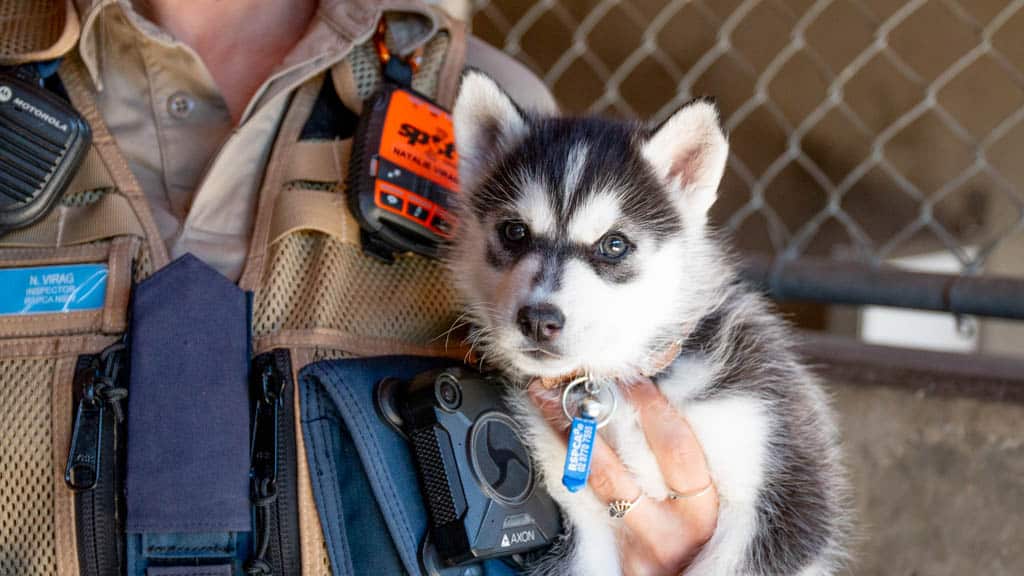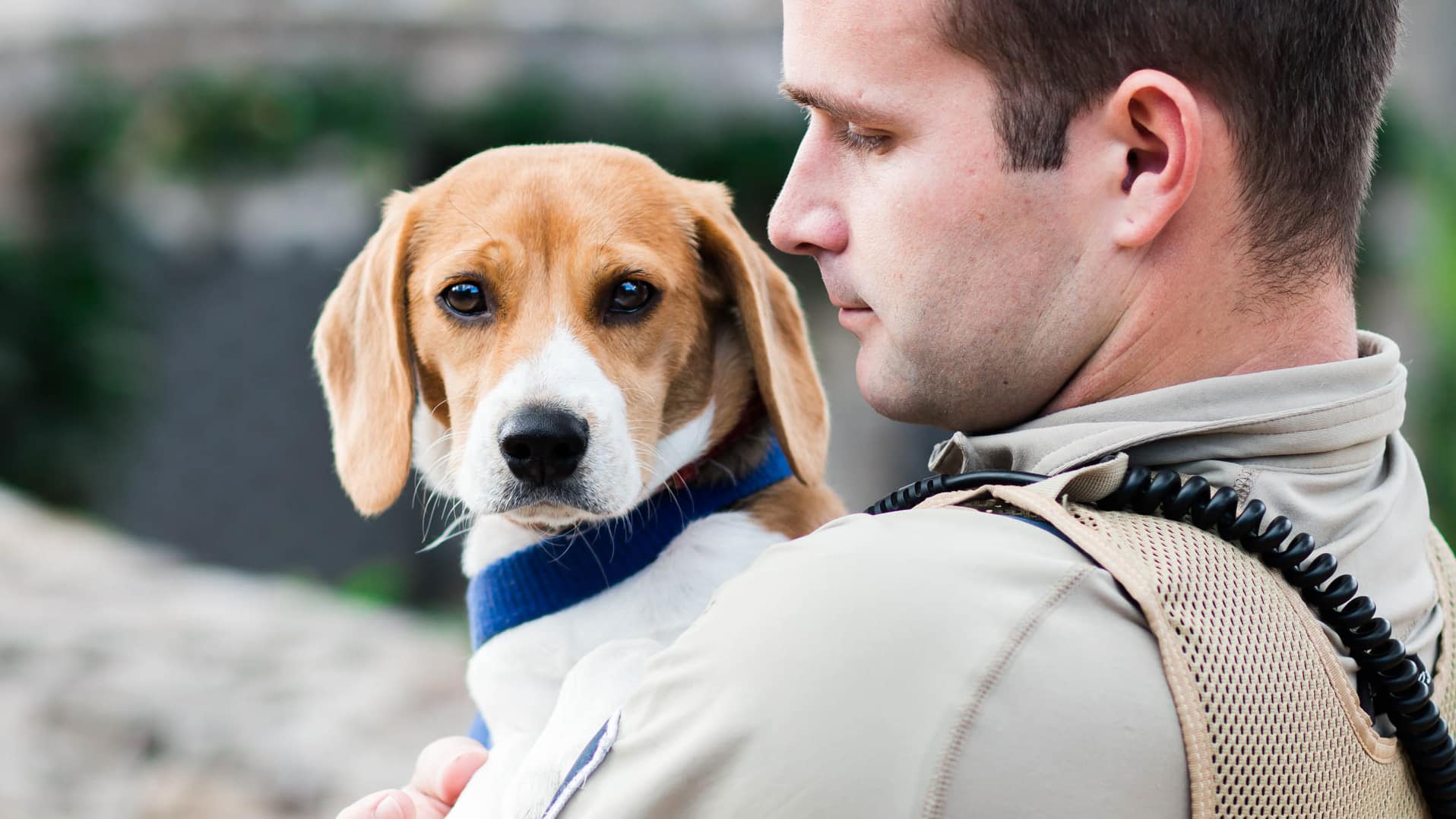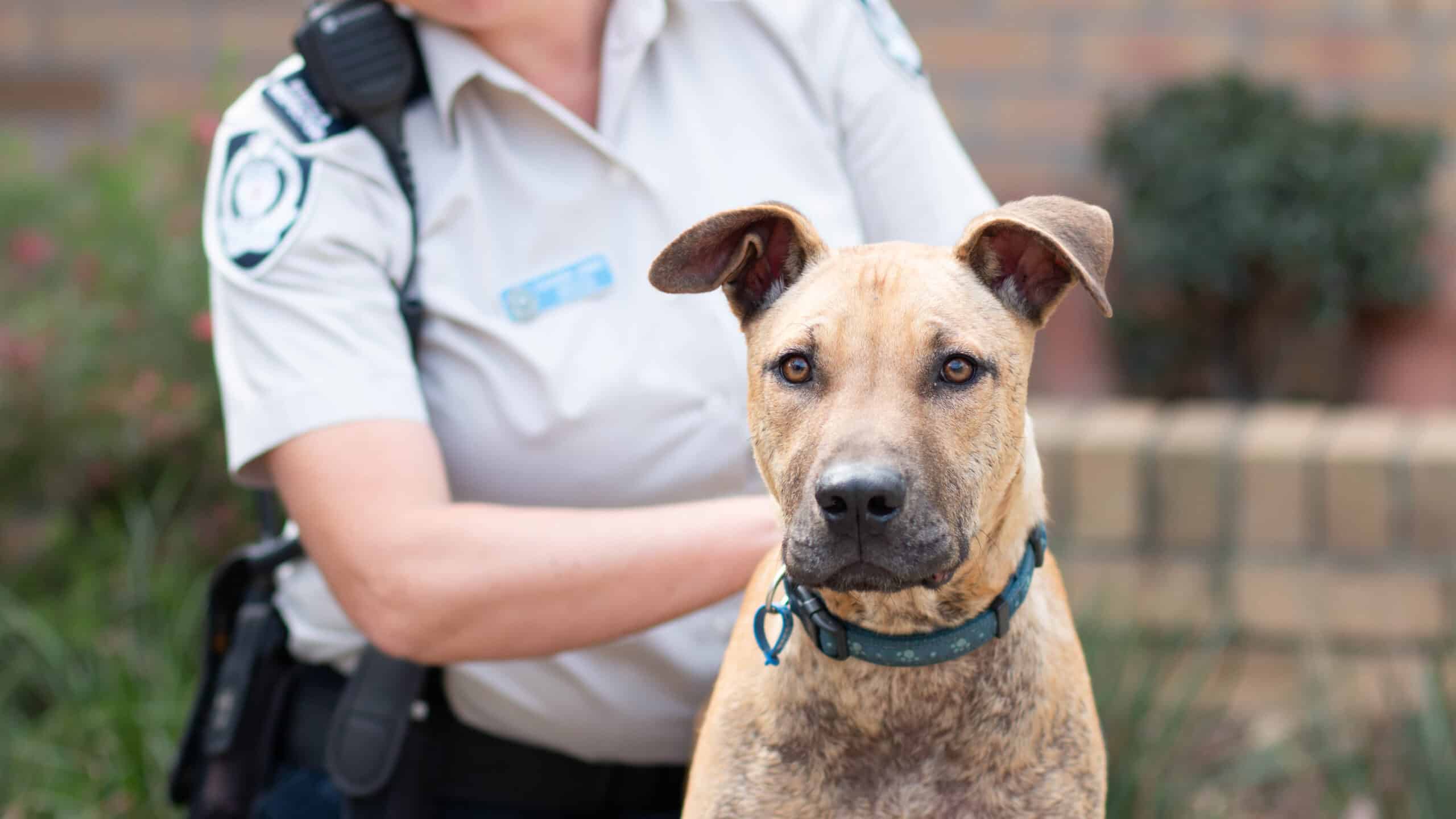Home > Ending Animal Cruelty > Investigating Animal Cruelty
If you witness or suspect any form of animal cruelty, we strongly urge you to report it. Your voice could be the one that saves a vulnerable animal’s life.

RSPCA NSW Inspectors lead the fight against animal cruelty, working tirelessly to protect vulnerable animals and their welfare. Whether it’s a case of deliberate cruelty or unintentional neglect, each investigation is approached with the utmost care and expertise.
Our teams are specially trained to work within our current legal framework, ensuring that all actions taken align with the Prevention of Cruelty to Animals Act 1979 and other relevant legislation. The work carried by our inspectors not only addresses immediate animal welfare concerns but also helps prevent future cruelty through education, compliance measures, and, when necessary, legal action.
Every case we handle represents an animal that might have otherwise suffered in silence. While our inspectors work every day to ensure animals have a voice, we rely on the community to help us protect them by lodging a cruelty complaint. If you suspect an animal is at risk, reporting it could be their first step toward safety.
In FY23-24, our inspectors worked tirelessly to protect animals, with an average of 66 cruelty complaints investigated every day. From welfare checks and rescue operations to enforcing animal welfare laws, our inspectors ensure that animals in distress receive the care and intervention they need.
In FY23-24 our Inspectorate investigated over 17,000 cruelty complaints, responding to community reports of neglect, mistreatment, and animals in distress. Our inspectors are on the ground every day, conducting welfare checks, enforcing animal protection laws, and ensuring that those responsible for cruelty are held accountable. These investigations not only lead to immediate interventions but also contribute to long-term change by educating communities and preventing future harm.
Among the 4,161 animals arriving through our inspectorate, we rescued 1,908 dogs, 1,069 cats, and thousands of other animals in need of urgent care. Once in our care, these animals receive veterinary treatment, rehabilitation, and the chance to find a safe and loving home.


RSPCA NSW Inspectors are on the front lines in the fight against animal cruelty. As the largest animal welfare enforcement agency in NSW, our Inspectorate is key to our mission to protect and care for vulnerable animals. Our dedicated team responds to a wide array of cruelty complaints, from reports of deliberate cruelty to instances of unintentional neglect.

RSPCA NSW has a dedicated Breeders Compliance Unit (BCU). When not responding to complaints pertaining to unethical breeding practices, our team proactively inspects known breeding establishments to ensure they are complying with the Breeding Code for Cats and Dogs.

RSPCA NSW Inspectors are authorised to enforce the Prevention of Cruelty to Animals Act 1979 as well as other regulations such as breeding and agricultural legislation. Our teams also sit on advisory committees and assist other agencies such as the NSW Department of Primary Industries, NSW National Parks and Wildlife Service, NSW Police, local council, and more.

When necessary, we take legal action to ensure that those responsible for harming animals are held accountable. With an in-house legal counsel, RSPCA NSW continue to play an essential role in preventing future cruelty and promoting animal welfare across the state.





RSPCA NSW rehomes a range of different animals, from dogs, cats, and birds to horses, rabbits, and sheep! We believe that all creatures, great and small, can bring joy to our families and homes. Begin your adoption journey today and make an adorable lifelong friend!
By providing temporary homes for our animals, we can ensure they get the care they need until they are ready to be adopted. Join our network of foster carers for an incredibly rewarding experience; with your help, we can change the lives of some of the state’s most vulnerable animals.
We rely on our generous supporters to continue assisting the thousands of animals turning to RSPCA NSW for help. No matter how small your contribution, every gift makes a lifesaving difference for animals in need.
By raising funds and lending a hand to communities and their pets, our volunteers play a pivotal role in our work throughout NSW. If you have a genuine concern for animals and enjoy meeting like-minded people, consider becoming an RSPCA NSW volunteer today!
If you witness animal cruelty or an emergency involving an animal, please contact RSPCA NSW immediately. You can reach us through our animal emergency hotline at 1300 CRUELTY or at 1300 278 3589. You can also report animal cruelty via our dedicated webpage here.
RSPCA NSW Inspectors enforce the Prevention of Cruelty to Animals Act 1979, as well as regulations and associated Animal Welfare Codes of Practice. They also educate communities by giving presentations and targeted animal welfare advice, the latter of which is given when cooperating with pet-owning individuals who are the subject of animal cruelty complaints. Where possible, our Inspectors work with animal carers to improve the health and welfare of animals in their care. RSPCA NSW Inspectors also sit on advisory committees, perform animal rescues, and assist agencies such as the NSW Department of Primary Industries, NSW National Parks and Wildlife Service, NSW Police, local councils, and more.
There are approximately 53 Inspectors throughout Sydney and regional NSW at any given time, providing education, supporting pet owners, and investigating animal cruelty.
At RSPCA NSW, jobs are given one of three classifications – urgent, ASAP, or routine.
Urgent jobs arise when RSPCA NSW is informed that an animal has suffered serious physical injury. They may have been attacked by a person or another animal and may require urgent veterinary treatment. Animals may be exposed to a life-threatening situation or be in immediate physical danger. RSPCA NSW Inspectors either attend within 24 hours of the complaint having been received or plan for another agency (such as NSW police) to attend within the same time frame.
ASAP complaints are viewed as serious but not life-threatening. RSPCA NSW Inspectors will endeavour to attend or take appropriate action within 48 hours of the complaint being received. ASAP complaints may involve animals in poor body condition, animals not receiving proper or sufficient nutrition, animals in need of veterinary treatment for non-life-threatening conditions (such as skin conditions and ear infections).
Routine jobs are attended when urgent and ASAP complaints have been managed or attended to. Dogs being given small enclosures, being continually tethered, or not receiving enough exercise are examples of routine matters. Inspections of pet shops and animal breeding facilities would be classified as routine jobs, as well as investigations into historic animal cruelty offences (cases where no animals are currently at risk).
The Prevention of Cruelty to Animals Act 1979 authorises Inspectors to enter land to examine animals when there are reasonable grounds to suspect an offence is, has, or is going to be committed with respect to an animal.
With respect to a dwelling, an Inspector can enter, with the consent of the occupier of the dwelling, the authority of a search warrant or if the Inspector has reasonable grounds to believe that an animal has suffered significant physical injury, is in imminent danger of suffering significant physical injury or has a life-threatening condition that requires immediate veterinary treatment.
This is why we require you to provide your name, address, and contact information when lodging complaints of alleged animal cruelty.
When animal cruelty offences or breaches of the animal welfare codes of practice are detected, Inspectors may seize animals and items connected with offences. As part of the investigation into alleged animal welfare or cruelty offences, our Inspectors will offer an alleged offender an opportunity to participate in a record of interview. At the completion of an investigation, the matter will be reviewed and depending on the nature, duration, significance, and ongoing impacts of the alleged offending there are a number of possible outcomes.
An alleged offender could be:
Animals seized by RSPCA NSW Inspectors in connection with alleged animal cruelty offences, may be held in RSPCA care until court proceedings are finalised.
When an animal cruelty offender is convicted by a Court, RSPCA NSW can seek the costs associated with the care of the animal(s).
We can also seek an order from the Court awarding custody of the animals to RSPCA NSW and further orders requiring convicted people with animals to rehome animals in their care. This can also include prohibition from purchasing, acquiring, or having any animals under their care, control or supervision for specific periods of time.
If you’ve already lodged an animal cruelty complaint with RSPCA NSW, we understand you may want to check on its progress. Rest assured, every report is taken seriously, and your complaint will go through a process of triaging to ensure that urgent cruelty reports are prioritised accordingly.
In addition to the prioritisation of your report, it’s important to remember that it may be at different stages, from initial assessment to an active or follow-up investigation. Though we will endeavour to give you peace of mind, please note that, for the safety of the animals and to protect the privacy of those involved, the amount of information we can share may vary depending on the stage of the investigation.
To check-in on an existing cruelty complaint, contact our team at 9770 7555. Press 1 in the prompt, and please ensure you have your case number ready to provide to our teams.
Unethical and illegal breeding practices can result in severe suffering for animals. RSPCA NSW relies on information from the community to investigate breeders who are not complying with animal welfare standards.
RSPCA NSW has a dedicated Breeders Compliance Unit (BCU). When not responding to cruelty complaints pertaining to breeders, our team proactively inspects registered breeding establishments to ensure they are complying with the Breeding Code for Cats and Dogs.
If you suspect a breeder is engaging in illegal practices – such as breeding animals in poor conditions or failing to meet basic welfare needs – you can make a Breeder Tip-Off to RSPCA NSW. Please provide as much information as possible, including the breeder’s details, location, and any supporting evidence.
By law, any individual, breeder, or organisation selling, adopting, or giving away a dog, cat, puppy, or kitten needs to use an official identification number in any advertisement of the animal.
Approved identification numbers include:
If you see an animal advertised without an identification number, we suggest either contacting the seller to see if a typo or mistake was made, or determining the validity of the number by looking it up using the NSW Pet Registry.
If you believe that a breach has been made intentionally, please report it to RSPCA NSW by using the form located on this page so we can investigate the matter further.
We promise to uphold the highest ethical standards. Your personal information has never been, and never will be sold or traded to other charities. This is our promise to you.



We acknowledge the Traditional Owners of the lands on which we live and work. We recognise and respect the enduring relationship they have with their lands and waterways, and particularly acknowledge the vital role animals have played in Indigenous life, stories and culture for tens of thousands of years.
The RSPCA is an independent, community-based charity providing animal care and protection services across the country.
This site is protected by reCAPTCHA and the Google Privacy Policy and Terms of Service apply.
The RSPCA is an independent, community-based charity providing animal care and protection services across the country.


This site is protected by reCAPTCHA and the Google Privacy Policy and Terms of Service apply.